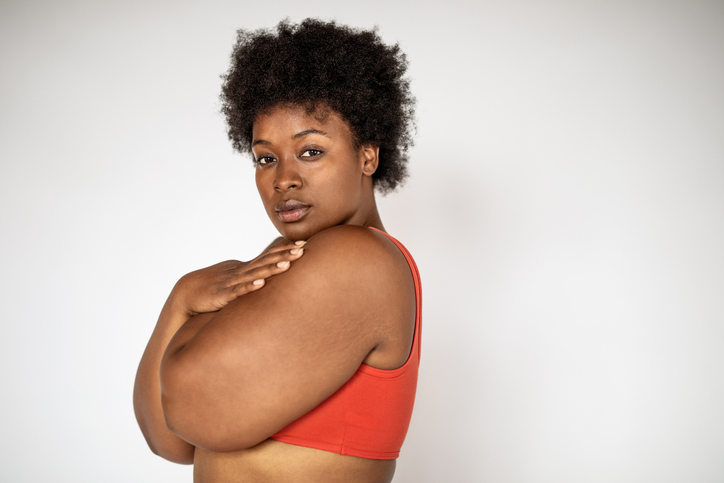
Source: Luis Alvarez / Getty
After an emotionally labor-intensive therapy session, I wrote in my journal, “Stop internalizing the faults of the people who failed you.” Nadia, my therapist, and I had just spent the last 60 minutes talking about my trauma and how I’d allowed it to impact me in ways I was and wasn’t aware of.
It was the longest hour of my life, but I left the session feeling empowered and in control. What I realized was that I’d been carrying the guilt and shame of people who’d violated me. Instead of giving them back their sh-t, I’d allowed what they’d done to me to dim my light, control my narrative, and hold me back. And, honestly, I was ready to move forward.
I’m a big girl and I always have been. I’ve been 5’8” since sixth grade, worn size 11 shoes since fifth, and had all of my wisdom teeth removed when I was 11. Since I was a child, I’ve had a body people have gawked at and grabbed on. I’ve always been curvy, round, and supple. People found me “sexy” before I was 12. I had curves before I knew what to do with them and I’ve never looked my age. Most of my trauma stems from people’s responses to my physicality. Because of that, I’ve always had a weird relationship with my body that I’m still working through. I’ve never considered my body ugly or unsightly. I’ve never felt bad about my body, but I have felt insecure when it comes to how other people respond to it. And that fear and insecurity have fueled a lot of mental and emotional turmoil.
Many people have treated my body like an amusement park for their pleasure often without my consent. In college, I was raped after a drunken night out with friends. I wasn’t able to consent, but still, someone took it upon themselves to “have fun” with me against my will. I’ve been sexually harassed at grocery stores, libraries, gas stations, you name it. And I’ve secretly carried the guilt and shame of my perpetrators with me, thinking maybe if I wasn’t so statuesque, curvy, and large they wouldn’t have violated me. I’ve thought maybe if I wore oversized clothes, they wouldn’t have noticed me. Maybe if I give them what they want, they won’t be able to take it from me. I have always centered myself as the victim, the helpless, and the one responsible for how people react to me. But after that therapy session, I realized a few things.
The shame is not mine to carry.
The people who violated, assaulted, and harmed me are 100 percent responsible for their own actions. There is nothing I could have or should have done differently because what they did is a direct reflection of who they are—not who I am. They should feel ashamed for the things they have done and said. I, unfortunately, was a casualty of their bad character. It is not my responsibility to make sense of the salacious behavior of other people. I have nothing to be ashamed of.
I can control my narrative.
I choose to focus on what I can control. One thing I can control is the way in which my narrative is told. Other people are not allowed to control my narrative and tell my story. Their wishes, secrecy, and guilt are none of my business. By allowing myself to control my narrative, I release shame and become empowered in the process. The main character of my story is me — not my perpetrators, not trauma, not my shortcomings, my friends, parents, or anyone else. My life’s narrative is about how I’ve triumphed. My narrative is about how I’ve managed to flourish in spite of. My narrative is about the work I’ve done, the way I’ve loved, and the legacy I leave behind. Sis, it is time to center yourself. There is power in telling your story and making it all about you. Yes, things have happened. Yes, you’ve been hurt, but you are still here.
I am more than my trauma.
I am so much more than what has happened to me. I am more than who left, who stayed, what happened, and what didn’t. I am a beautiful human worthy of love, affection, and respect even when other people have treated me with less than that. I am great, powerful, and resilient. My trauma may have damaged me, but it did not obliterate me because I am greater than it. I am not a victim; I am a survivor. I have managed to survive and, in many ways thrive, in spite of what has happened to me.
I avoided writing this article for weeks, but telling my truth has been liberating. My paradigm is shifting, my wounds are healing and I wish that for you. You do not have to remain a victim. You can honor your trauma and your experiences without being held captive by them. I wish healing on all of us as we grow. Give people back their sh-t. Give them their drama, their shame, and their guilt. Control your narrative and thrive.









